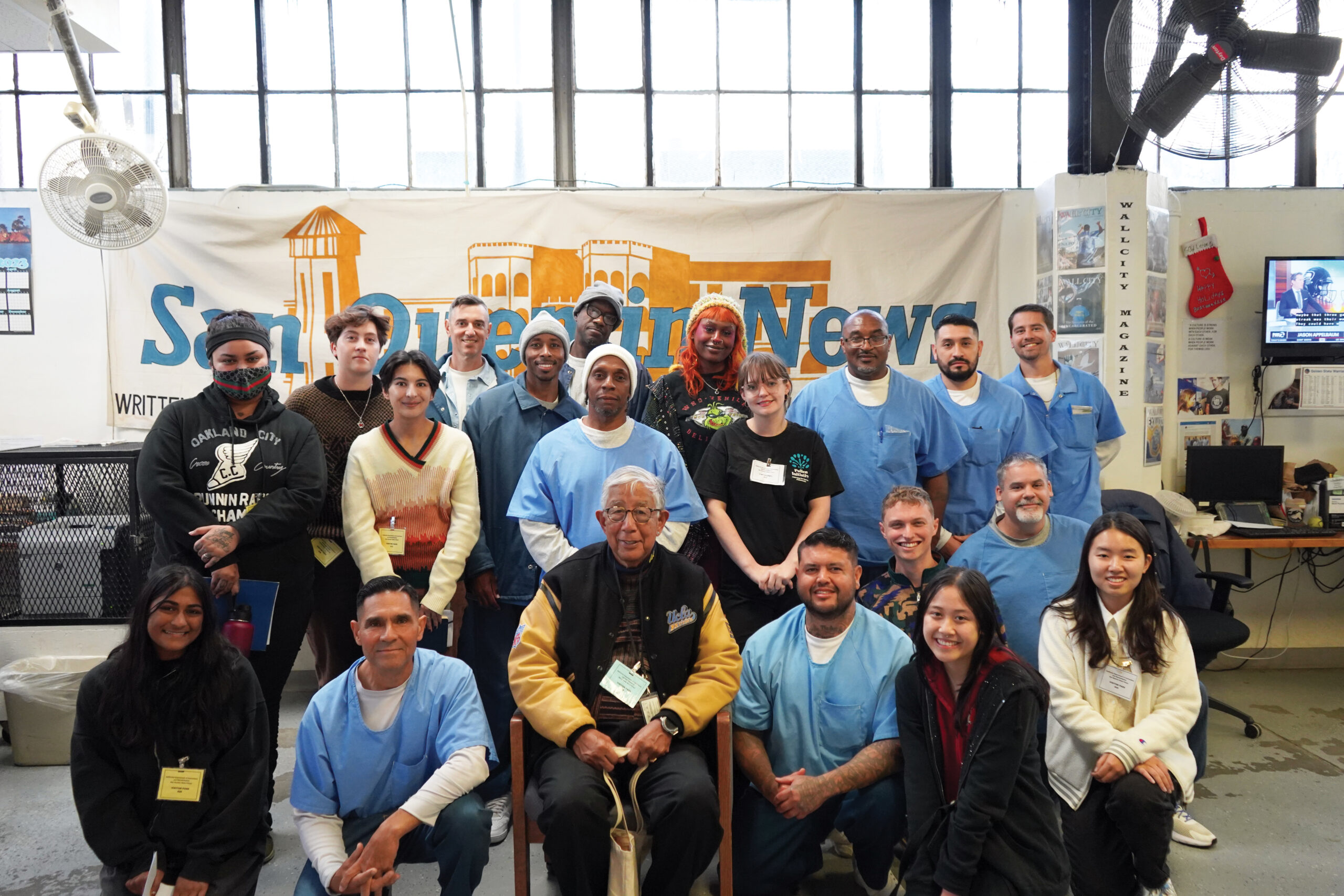
Some visitors come to San Quentin to satisfy their curiosity, some come because they want to contribute to social justice, and some come because they feel inspired by hard work that goes into the production of a newspaper. Every Sunday afternoon, the newsroom of the San Quentin News hosts a cadre of students from the University of California, Berkeley. They volunteer their journalistic talents to help with editing and to research stories. The UC–SQ relationship goes back more than 10 years.
In March 2013, at the inception of the class, then-editor-in-chief Arnulfo T. Garcia wrote that the San Quentin News has “created a partnership with the University of California at Berkeley, where Professor William Drummond gives us further assistance by bringing in journalism students to help with story ideas, editing, and research. The students receive university units toward their degrees for their work. Their presence in this prison also exposes them to our environment, and basically we learn from each other.”
Slightly more than ten years later, Drummond, a long-time figure in academics and in American journalism, continues bringing in his students. “No precedent existed for such a class,” Drummond, 79, said about his class at the prison.
“The class is not based on a course of study. My students learn in the field, much like social work,” Drummond said. “Taught at graduate 200 level, this class gives us much wider latitude in the approach we take in teaching, like including undergraduates, and it has much less structure than other classes. We call it ‘service learning,’ which means that it has an experiential curriculum not necessarily based on a specific syllabus.”
The three-credit class consisted of 15 students for the fall 2023 semester.
Rae, an undergraduate with a major in urban studies and a minor in journalism, works for the Daily Cal on the police beat, which she called “a fun, light little subject.” She said editing the San Quentin News gives her an alternate perspective on incarceration. The San Francisco Bay Area native said she had never before gone inside the prison, and found the class “an opportunity that she could not pass up.”
Annie, a Cal senior, majors in American history and women’s studies. She said that she deeply cares about journalism and had long-wanted to experience working in a real newsroom. She said she thinks of mass incarceration as an injustice and believes that her editing work gives her an opportunity to learn firsthand about the intricacies of the criminal justice system.
A Seattle native, she said she plans to attend graduate school in journalism at Stanford, or better yet, in Paris: she speaks French fluently. “I like you guys,” Annie said, “the managing editor “seems so determined.” She added that she appreciated hard work and that she admired the sense of community in the newsroom.
“More prisons should have something like this,” said Lucy M., a junior anthropology major from Southern California. An incarcerated family member who took a writing class in prison inspired her advocacy for “the right to write.” She called editing the San Quentin News a “cool experience to work in a very polished newsroom with multiple layers of editing in AP style.”
Second-year journalism graduate student Grace came to Berkeley specifically because of the San Quentin program. She grew up in Levittown, Pennsylvania, and graduated from Ole’ Miss with a print editorial journalism degree. She has an extraordinary command of historical facts, and excellent attention to detail.
Grace said she has a philosophy deeply grounded in principles of truth, fairness, and social justice. Possessing extraordinarily high energy, she tackles written English with unreserved certainty about her competence. One of Grace’s long-term goals includes training writers for community journalism and launching publications like the San Quentin News in communities around the country.
Clara, an English major, has visited San Quentin only a few times this semester. She said she has lived in the Bay Area her whole life and never knew anything about San Quentin beyond its name. Clara said she likes to read Jane Austen but feels overwhelmed with too much obligatory reading for school. She said she liked the look of the newsroom; it reminded her of the Berkeley student paper.
Niko, who had recently graduated from Cal in wildlife ecology and conservation with a minor in journalism, finds himself fascinated by the intersection of science and journalism. He works as a photographer and writer for Caravan Travel & Style, a student-run magazine at UC-Berkeley. He said Professor Drummond asked him to join the class to give him an avenue for creativity. Niko said he wants to continue his education toward a PhD in evolutionary biology, probably in the United Kingdom. Niko said he feels passionate about the San Quentin project and about restorative justice.
Tarini, a second-year journalism student from India, said San Quentin was the one class she felt compelled to take before graduation. Studying with Professor Drummond made her believe in the power of journalism to change the world. She considers the San Quentin News an “incredible initiative,” and shared that the paper made her feel “double, triple, and quadruple-inspired.” After graduating in May, she hopes to report in the United States for a few years and then report in India. She said she “feels honored to come here” and that “the world needs to know about San Quentin News.”
For Professor Drummond, the class has come full circle. “In the past, the class had mostly very young students. Graduate students all wanted to know specific stuff that would help them to get jobs, but after a while, the buzz started to call this a cool class and graduate students applied,” About his current class, Drummond said “this crowd seems very young with mostly undergraduates and two graduate students.
Asked about the future of the class, Drummond said, “I will be on sabbatical until September 2024, but I will still bring in students who want to work in the newsroom.”